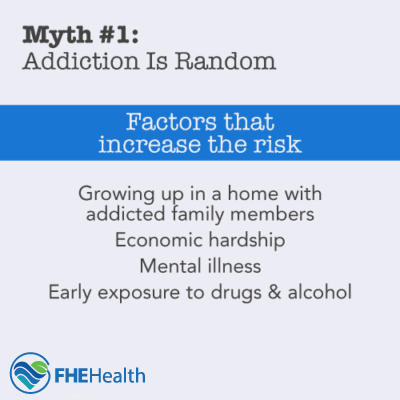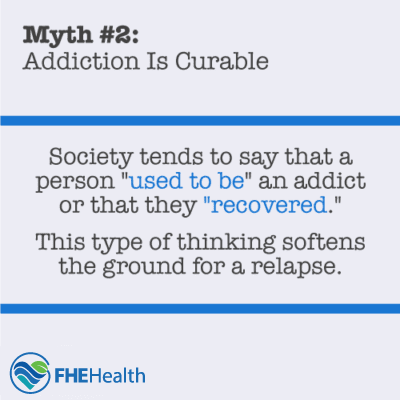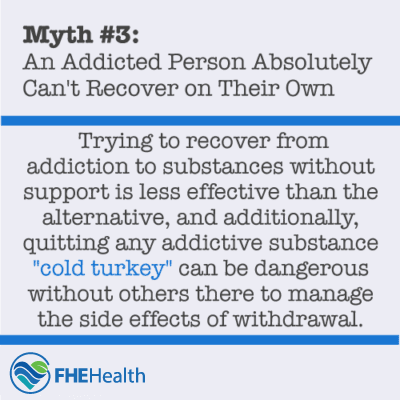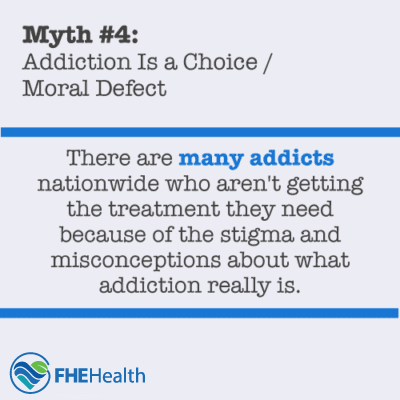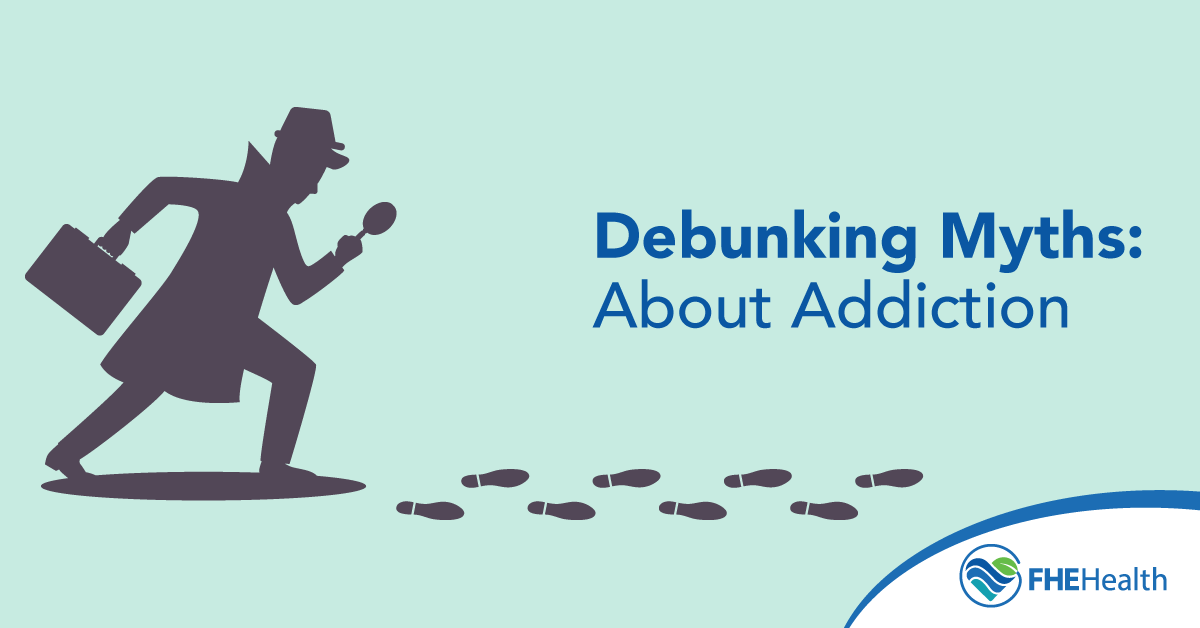
An estimated 48.7 million people over the age of 12 in the United States have some form of substance misuse disorder. While that’s nearly a quarter of the population of adults and teenagers, many people still don’t fully understand addiction. Part of this lack of understanding stems from addiction misconceptions that have persisted for decades. Dispelling these addiction myths is important for anyone who may be struggling with addiction or knows someone else who is.
Let’s dig into six common addiction myths and why they’re not accurate.
Myth 1: Addiction Is Random
While it’s true that addiction can happen to anyone, factors beyond random chance can determine who might develop a substance misuse disorder. Risk factors that make some people more likely than others to abuse addictive substances can include:
- Growing up in a home with addicted family members
- Instability in the childhood home, such as absentee parents or moving frequently
- Economic hardship, such as joblessness, homelessness, or food insecurity
- Social hardships, such as facing discrimination or struggling with isolation
- Mental illness
- Early exposure to drugs and alcohol
Myth 2: Addiction Is Curable
Another of the most common addiction misconceptions is that addiction is curable. The ways society talks about substance misuse disorder contributes to the myth. People often say a person “used to be an addict” or that they “recovered.” For members of the addiction treatment community, this is a dangerous way of thinking because it gives patients and their family members false expectations for the treatment offered.
The truth is that recovery from addiction is a lifelong process, because your body never returns to a state where you’re no longer affected by it. A relapse can happen a day or week after treatment, and it’s certainly more likely during this time. However, relapse can also occur years removed from treatment. The lifelong risk for addiction is a major reason it’s important to have a strong support system, even when you feel completely recovered.
Myth 3: An Addicted Person Absolutely Can’t Recover on Their Own
Is assistance always needed to recover from addiction? Not necessarily. People have had success recovering in many ways. Still, it’s well-documented that the wisest approach is to seek help. Trying to recover from addiction to drugs or alcohol without support is less effective than the alternative. Additionally, quitting any addictive substance cold turkey can be dangerous without others there to help manage the side effects of withdrawal.
The National Institute on Drug Abuse (NIDA) has done extensive research on the safest and most effective methods of recovery, which are published in its Principles of Effective Treatment, a best practices guide for treatment providers and patients. Basically, what NIDA found is that the longer an addict engages with inpatient or outpatient treatment with specialists, the lower the relapse rate is after they complete the bulk of their treatment.
Myth 4: Addiction Is a Choice or Moral Defect
Many addicts nationwide aren’t getting the treatment they need because of the stigma and misconceptions about what addiction really is. Using drugs is a choice, but addiction is a disease that can and does happen to anyone. That’s why it’s so important to ensure everyone has equal access to effective treatment geographically as well as economically.
This myth that addiction occurs due to a moral defect or is purely a choice has trickled down into many institutions that deal with drugs in the United States. Insurance companies contribute to the problem by often failing to cover addiction the same way other chronic diseases are covered. The war on drugs has also worsened the problem by treating those facing addiction as criminals.
Myth 5: Treatment Won’t Work Until You Hit Rock Bottom
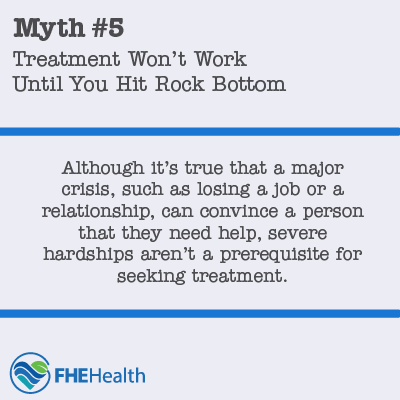 One of the most potentially harmful addiction myths is that treatment won’t be effective until a person reaches rock bottom. The idea behind this addiction misconception is that if someone hasn’t suffered severe consequences due to their substance abuse, they won’t be ready to put in the effort required to succeed in a treatment program.
One of the most potentially harmful addiction myths is that treatment won’t be effective until a person reaches rock bottom. The idea behind this addiction misconception is that if someone hasn’t suffered severe consequences due to their substance abuse, they won’t be ready to put in the effort required to succeed in a treatment program.
Although it’s true that a major crisis, such as losing a job or a relationship, can convince a person that they need help, severe hardships aren’t a prerequisite for seeking treatment. A person may receive encouragement from loved ones to seek help early or simply realize on their own that they have a problem.
Myth 6: Relapse Means Treatment Failed
 As previously mentioned, relapse is common during addiction recovery. Unfortunately, many people mistakenly believe that relapse is evidence that treatment was ineffective, and this addiction misconception can lead individuals to avoid seeking help again when relapses occur.
As previously mentioned, relapse is common during addiction recovery. Unfortunately, many people mistakenly believe that relapse is evidence that treatment was ineffective, and this addiction misconception can lead individuals to avoid seeking help again when relapses occur.
The truth is that relapses — or a renewal of symptoms — are common with many chronic conditions. When compared to some other health problems, addiction actually has a lower relapse rate. Take asthma and high blood pressure, for instance. Relapse rates for these conditions are 50% to 70%, but only 40% to 60% of people who undergo addiction treatment relapse.
Instead of seeing relapse as a sign of failure, experts view it as a setback on the journey toward lifelong recovery. Seeking treatment again can help someone who relapses renew their commitment to sobriety and learn additional strategies and skills to remain drug- and alcohol-free over the long term.
Why Are Addiction Misconceptions Dangerous?
Anytime a topic is clouded by misinformation, misconceptions arise and damage the people and institutions that deal with that topic. In this case, individuals without accurate information may have a harder time finding effective help for their disease, and treatment facilities have a harder time providing effective treatment when the community is ill-informed about their purpose and value.
Get More Substance Abuse Facts and Help With Addiction
Knowing the truth about common addiction myths is a positive first step toward breaking free of addiction. If you or a loved one is ready to continue on the journey toward recovery, FHE Health is here to help. Our counselors are ready to give you additional substance abuse facts and help you explore your treatment options. Contact us today.
